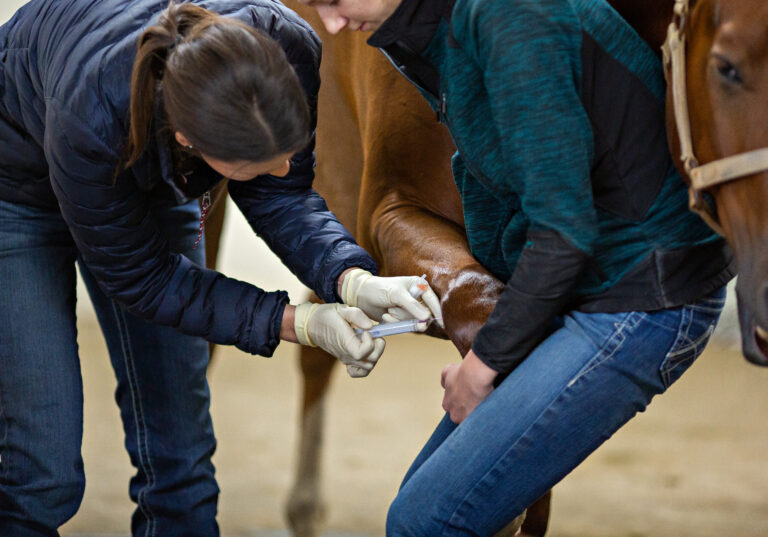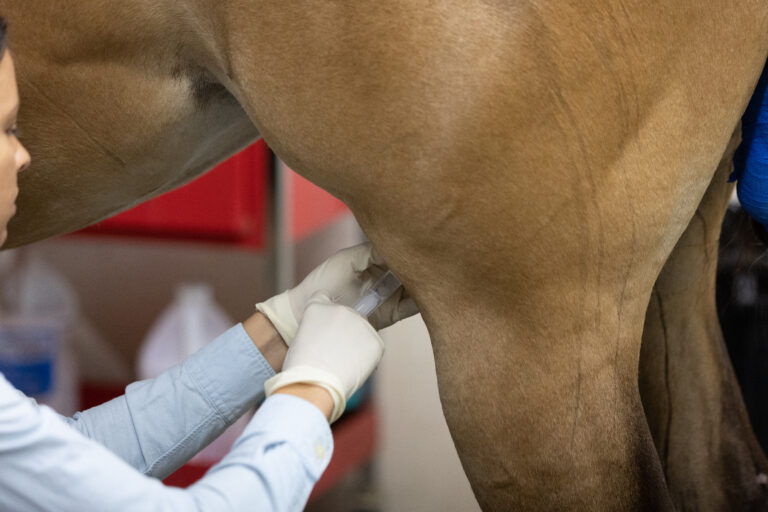
Obesity and insulin dysregulation pose particular challenges to equine veterinarians as they strive to care for client horses affected by equine metabolic syndrome (EMS). Client education is important in managing nutrition and exercise as strategies to reduce weight and fat deposition in relatively sedentary horses. Horses need to be restricted from pasture and/or fed a diet low in non-structural carbohydrates. Diet management is coupled with exercise that burns calories and helps to increase insulin sensitivity. However, getting these strategies implemented is often easier said than done due to horse owner pushback to recommendations by their equine practitioners.
Hyperinsulinemia is associated with development of laminitis, so it is thought that control of insulin might be an important preventative strategy. Drug therapy would be a welcome adjunct to management techniques to help control hyperinsulinemia. Currently, no medication is available for this purpose.
Researchers are looking into use of velagliflozin, a sodium-glucose linked transport-2 inhibitor (SGLT-2) that reduces reabsorption of glucose by the kidneys so that more glucose is excreted through the urinary tract. An initial study that examined 39 days of treatment with velagliflozin yielded positive results, so a larger Australian study was untaken for 16 weeks of daily treatment followed by a four-week withdrawal period [Meier, A.; de Laat, M.; Reiche, D., et al. The efficacy and safety of velagliflozin over 16 weeks as a treatment for insulin dysregulation in ponies. BMS Veterinary Research 2019, vol 15, no. 65; https://doi.org/10.1186/s12917-019-1811-2].
The study looked at several criteria for the effects of treatment or no treatment with velagliflozin on 12 ponies—6 treated and 6 controls:
- How well the medication was able to control insulin responses to oral carbohydrate challenge in insulin-dysregulated ponies.
- The presence or absence of adverse effects during treatment and for four months after.
- Changes in body weight or leptin concentrations.
The results are promising. The insulin response to dietary challenge at 16 weeks in treated ponies decreased by 43%. (This diet challenge presented the ponies with higher levels of NSC than is found in the typical oral sugar test.) Insulin levels in treated ponies decreased to below a threshold level (> 195 uIU/ml) for development of laminitis. However, insulin resistance remained unchanged in treated ponies during the dietary challenge.
A month after therapy was stopped in treated ponies, insulin concentrations rebounded to within 3% of pretreatment values. Control ponies’ insulin responses stayed the same over the study period, neither increasing nor decreasing.
Body condition scores, neck crest scores, and leptin concentrations did not change in either the control or treated groups during the study course. It is noted the daily diet of the ponies in this study was notably high in NSC in order to maintain their “fat” body condition, which might explain the lack of reduction in body weight or leptin. In addition, the ponies were stabled individually during the day and turned out together on a 2-acre dry lot at night, but had no other exercise and no pasture access.
Despite a concern that excess glucose urinary excretion could cause hypoglycemia, this did not occur. None of the ponies in either group experienced any adverse health effects, and only one control pony developed laminitis. More investigation, including use of velagliflozin in grazing horses, is warranted based on the results of this promising study.




